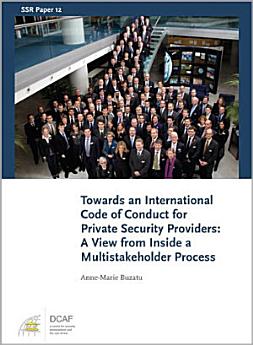Towards an International Code of Conduct for Private Security Providers: A View from Inside a Multistakeholder Process
About this ebook
About the author
Anne-Marie Buzatu is deputy head of the Public-Private Partnerships Division at the Geneva Centre for the Democratic Control of Armed Forces (DCAF). Working under a mandate of the Swiss government, she led DCAF’s work to support the elaboration of the International Code of Conduct for Private Security Service Providers from January 2009 to November 2010. She subsequently led the development of the ICOC Association, a multistakeholder governance and oversight mechanism for the ICOC, which began operations in September 2013. Current projects include working with the International Committee of the Red Cross to develop guidance related to security sector governance and reform for multinational companies, as well as supporting better governance approaches for internet/cyber security.







